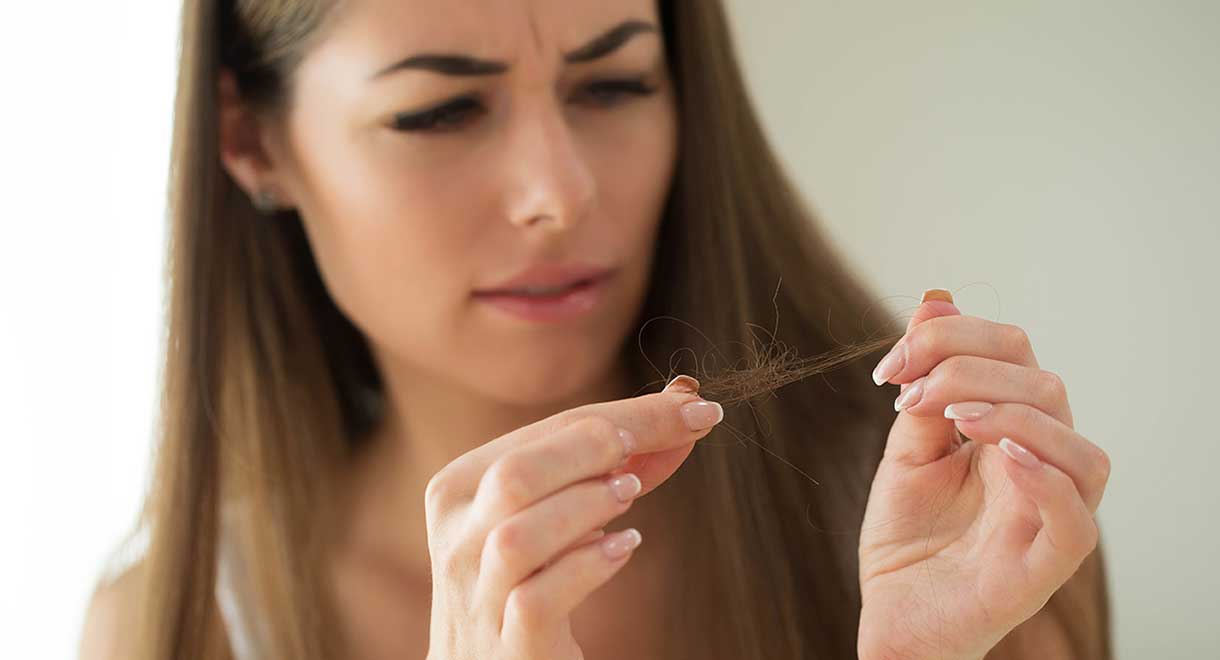Hair loss and the thyroid
By naturopath Margaret Jasinska
Scalp hair loss in women is an incredibly common problem, and one of the most distressing health concerns. It can cause a great deal of emotional trauma and this is very understandable. The good news is that in the vast majority of cases the hair does grow back.
The amount of hair you have on your scalp and the quality of the hair are good general indicators of your state of health. There is always an explanation for scalp hair loss; it just requires a bit of investigation.
Women with an under active thyroid gland typically lose some scalp hair. The hair loss tends to occur evenly throughout the entire scalp. That means it does not come out in patches and it is not more noticeable at the front and sides of the scalp if it is purely due to an under active thyroid. Restoring normal healthy levels of thyroid hormones usually helps to stop the hair loss. Some women require prescription thyroxine or natural porcine thyroid hormone.
I have found that just about every patient who has a thyroid problem also suffers with some nutritional deficiencies. These deficiencies may have contributed to the development of the thyroid problem in the first place, and they can aggravate the symptoms of an under active thyroid, such as hair loss, fatigue and inability to lose weight.
Many of the patients we see are already taking thyroid hormone replacement and their thyroid hormones are in the normal range. Yet the patient is still experiencing scalp hair loss. Why is this? There are several other possible explanations for scalp hair loss, including:
- High blood levels of male hormones (androgens) in women. This is a common feature of polycystic ovarian syndrome and type 2 diabetes, but may also occur during menopause. A blood test called a Free Androgen Index (FAI) can detect your level of free male hormones. This hormone problem typically results in hair loss predominantly from the front and sides of the scalp. Weight loss and a lower carbohydrate diet can help to lower male hormones. Women with this problem are also typically deficient in progesterone, which further aggravates scalp hair loss. A natural progesterone cream can help to thicken the hair, and you can obtain a prescription from our clinic.
- Postpartum hair loss is not uncommon and usually resolves itself within six months. If you are breastfeeding make sure your diet is as nutritious as possible, because many nutrients are lost in breast milk. After giving birth, there is a steep drop in your blood level of the hormone progesterone. This can cause dramatic scalp hair loss but it is usually only temporary. However, using a natural progesterone cream can help to mitigate this problem.
- Some autoimmune diseases can cause hair loss. Most cases of over active and under active thyroid gland are caused by autoimmune disease, and this aggravates the scalp hair loss. However, there are also other autoimmune diseases that can lead to loss of scalp hair, sometimes in patches. Overcoming autoimmune disease involves healing the gut lining (healing leaky gut), correcting nutrient deficiencies and improving liver function. This can feel difficult and overwhelming, particularly for people who suffer with fatigue. There is detailed information that can help you in our book Healing Autoimmune Disease: A plan to help your immune system and reduce inflammation. Dr Cabot’s 15 Day Cleanse consists of a three stage program that works on improving gut, liver and immune health. It comes with an easy to follow eating plan that is ideal for those suffering from a health problem such as autoimmune disease, hair loss or fatigue.
- Stress and nutritional deficiencies can lead to scalp hair loss. Deficiency of iron and B vitamins is most commonly at fault. Very low calorie diets can also produce scalp hair loss. Most women lose some scalp hair if they lose weight very quickly and this is only temporary.
- Some medications can produce hair loss as an unfortunate side effect. These include drugs for blood pressure and heart conditions, gout, arthritis and some antidepressants.
The MSM (natural sulphur) in Collagen Food powder helps promote healthy and thick hair. A clinical study was designed to observe the efficacy of MSM as an oral supplement. Significant improvements of hair density, hair-density terminal, and hair diameter were observed after 120 days of MSM use. Study subjects observed growth of new hairs and found that their hair had more volume and was less brittle after 45, 90, and 120 days of MSM supplementation. Earlier studies indicated that oral supplementation with MSM influences skin and hair in a positive way. Methylsulfonylmethane (MSM), an organosulfur compound, is recognized as an antioxidant and anti-inflammatory. MSM is a source of sulphur for the body. Maintenance of hair strength and collagen requires a regular supply of sulphur, which oral supplementation with MSM provides. MSM occurs naturally in some vegetables, fruit, turkey, beef, lamb, fish, eggs, and chicken. Collagen Food powder contain MSM plus zinc, vitamin C, biotin and silica.
For more information about hair loss and the thyroid, see the book Your Thyroid Problems Solved. Thyroid Health capsules help to support the thyroid gland.
References
Muizzuddin N, et al, Beneficial effects of a sulfur-containing supplement on hair and nail condition. a prospective, double-blind study in middle-aged women. Nat Med J. 2019;11(11):1-8.
Muizzuddin N, Benjamin R. Beauty from within: oral administration of a sulfur-containing supplement methylsulfonylmethane improves signs of skin ageing. Int J Vitam Nutr Res. 2022;92(3-4):182-191. Int J Vitam Nutr Res.
doi: 10.1024/0300-9831/a000643. Epub 2020 Feb 21.
Methylsulfonylmethane and Hair Health. Effect of a sulfur-containing supplement on improving hair condition, Natural Medicine Journal. Janaina Rosa Cortinoz.









Leave A Comment